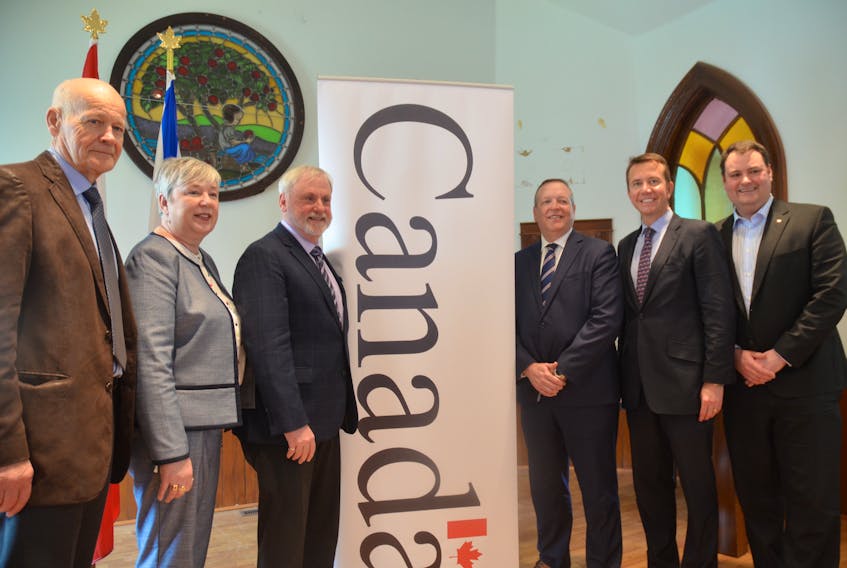GREENWICH, NS - It’s about more than the ability to stream movies: it’s about bridging the digital divide and providing equal opportunity for all Nova Scotians to participate in the digital economy.
A total of $26.4 million in funding aimed at providing high-speed Internet service to residents, businesses and institutions in 64 rural and remote Nova Scotia communities was announced at Bishop Hall in Greenwich on May 4.
Kings-Hants MP and President of the Treasury Board Scott Brison announced $17.7 million in federal funding through the federal Connect to Innovate program. $1.2 million will come from the Nova Scotia Internet Funding Trust; $6.9 million from project applicants and $517,000 from other sources.
In an interview following the announcement, Brison said that, as a rural Nova Scotian, he is excited about the investments being made to enable communities to connect to the world through broadband.
He said the investment is largely focused on backbone and last-mile infrastructure but more needs to be done. Brison said the partnership between the federal and provincial governments is stronger than it’s been in decades and they’re focusing on what they can do to advance communities and the region.
“We’re moving the needle in terms of the ability of rural Nova Scotians to compete and succeed, so today’s announcement is a big step forward but there will be more announcements by the provincial government and municipal governments that will have been enabled by Connect to Innovate,” Brison said.
The federal funding will support 27 high speed Internet projects. Brison highlighted the federal investment in five projects that will benefit 19 communities and 28 institutions in western Nova Scotia.
These include $5.6 million for the Municipality of the County of Kings for a project to provide 10 communities and 12 institutions with high-speed access in partnership with iValley.
Kings County Mayor Peter Muttart said the financial leverage being provided by the federal government is a first start but municipalities still have substantial funds that they must bring to the table. He said they’re still looking for partners and leverage and there’s never been a better time to launch these kinds of initiatives with the degree of co-operation amongst the various levels of government and with businesses and citizens in our communities.
“That makes this event all the more important because we’ve all had this objective in mind from the day that we took office,” Muttart said.
Bell Canada will receive $388,331 for three projects that will provide five communities and four institutions with high-speed access. Bell Canada executive vice president and chief financial officer Glen LeBlanc said people will be able to do their work from home, opposed to having to leave their community to find adequate Internet speeds.
“This is going to give people in rural communities an ability to connect, to operate just as if they were in urban (communities) and I think it’s going to open up and create great opportunity for the future,” he said.
Bell is going to invest $1.2 million dollars in projects in partnership with the municipal, provincial and federal governments. Some of the projects will bring fibre optic connections directly to the home and others will involve what he referred to as fibre to the node. He said this would bring the type of Internet speed that consumers expect.
One community that will benefit is Glooscap First Nation. LeBlanc said they would get through the contract stage with their partners then focus on pre-engineering work.
“We’ll start that immediately,” LeBlanc said. “Generally, these projects take two or three years for full completion and we’ll move as fast as the Minister wants us to move.”
Kings-South MLA Keith Irving said the provincial government has put a great deal of effort into growing our economy over the last four years when it comes to education and training, job creation and innovation. One of the barriers to economic growth in Nova Scotia has been Internet access and delivering it to rural and remote communities has been a challenge.
“That’s why it’s time now that government steps up and partners in reaching as many Nova Scotians as we can,” Irving said.
West Nova MP Colin Fraser said access to high-speed is an essential service and an economic imperative that is important to small businesses and people looking to locate to rural Nova Scotia.
South Shore-St. Margaret’s MP Bernadette Jordan said it’s important that we continue to develop rural broadband across the province. This is the way the world is moving and it’s how we do business now. Some of the communities she represents still have dial-up Internet service or none at all.
The federal government’s $500 million Connect to Innovate program is investing in building the digital backbone of high-speed Internet networks. These are digital highways that move data in and out of communities and are essential for schools, hospitals, libraries and businesses to function in today’s digital world.
What they said
“The ubiquity of the Internet has made it so that the prosperity of Canadians and the prosperity of rural Nova Scotians depends increasingly on access to high-quality, high-speed Internet,” - Kings-Hants MP and President of the Treasury Board Scott Brison
“I can tell you that, representing small communities in rural Nova Scotia, one of the most important issues that I heard during my election campaign and since as representative is the need for high-speed Internet in small rural communities.” – West Nova MP Colin Fraser
“One can actually feel the pulse of co-operation that’s taking place at the present time. The partnerships are good between the federal government and the provincial government and the municipalities and amongst the municipalities.” – Kings County Mayor Peter Muttart
“We have a strong record of co-operation with governments and communities across Canada when it comes to the expansion of advanced communication networks. These partnerships have allowed us to provide rural and remote communities with access to the social and economic benefits that come with being on Canada’s best broadband networks.” – Bell Canada executive vice president and chief financial officer Glen LeBlanc









